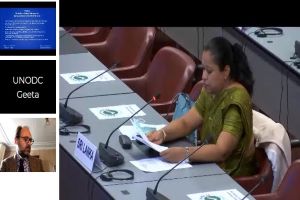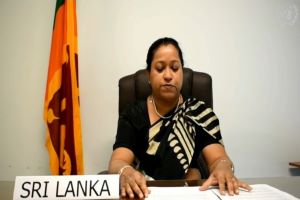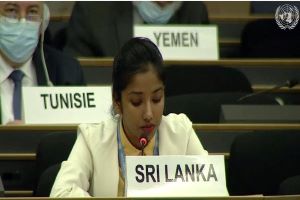
The Eighteenth Meeting of the States Parties to the Convention on the Prohibition of the Use, Stockpiling, Production and Transfer of Anti-personnel Mines and on Their Destruction
Agenda Item: 7. General exchange of views (continued)
Mr. President,
At the outset I would like to commend the excellent manner in which you lead the work of the Convention and to appreciate your team for facilitating this meeting despite the extraordinary circumstances.
Sri Lanka will be pleased to join the Article 5 Implementation Committee exemplifying Sri Lanka’s strong commitment to advancing as well as contributing to the universal realisation of the salutary objectives of the Convention.

International Dialogue on Migration – 2020
Panel 2: Protection of vulnerable migrants during and beyond the COVID-19 crisis.
Statement by Sri Lanka
15 October 2020
Mr Antonio Vittorino, DG/IOM
Excellencies and Colleagues
The focus of this panel on the protection of vulnerable migrants during and beyond the COVID-19 pandemic is not only timely but a present necessity. It is our hope that this discussion will lead to a better understanding of the issues, challenges and gaps in providing protection and assistance to this group, and result in stronger cooperation between Governments and other stakeholders in the development of policies, practises and networks ensuring greater assistance and protection for vulnerable migrants during the present pandemic and beyond.
Migrant workers comprise 3.5% of the world’s population and are a crucial part of the global workforce. The contribution of migrant workers to economic growth and development has become critical not only for the countries of origin, but also for upward socioeconomic mobility in the region and internationally.

UN Human Rights Council Social Forum 2020
The role of the state and public policies to address poverty and inequalities
09 October 2020
Statement by Sri Lanka
Mr. Co-Chair,
At the outset, Sri Lanka wishes to congratulate the distinguished Permanent Representatives of Azerbaijan and Mongolia who serve as co-chair rapporteurs of the 2020 Social Forum, an annual engagement of this Council to which my country attaches great importance.
As a country whose post-independence national policies have been premised exclusively on the wellbeing of its people, the role of the state and the public policies of Sri Lanka have for long years been oriented in the trajectory of addressing poverty and inequalities among its population.

Statement by Sri Lanka at the General Debate of the 71st Annual Session of the Executive Committee (ExCom) of the United Nations High Commissioner for Refugees (UNHCR) programme
Mr. Chairperson,
High Commissioner Mr. Filippo Grandi,
Excellencies, Distinguished delegates,
Sri Lanka takes this opportunity to congratulate you and the Bureau for the excellent manner in which you have steered the work of the Executive Committee since assumption of Office in 2019.
We appreciate the presentation by the High Commissioner and his important remarks on the on how the Global Compact on Refugees has enabled the response to both new and protracted refugee crises, as well as to the COVID-19 emergency. We value his efforts and those of his dedicated staff for their continuous efforts to assist and improve the well-being of over 79.5 million displaced persons worldwide with a view to ensuring sustainable solutions for their concerns. Unfortunately, as per the global trends, the numbers keep on rising, while possibilities for durable solutions become complicated by the day.

45th Session of the Human Rights Council
Item 5: Interactive dialogue with the Assistant Secretary General for Human Rights on the report of the Secretary-General on co-operation with the United Nations, its representatives and mechanisms in the field of human rights
30 September 2020
Statement by Sri Lanka
Madam President,
The Government of Sri Lanka (GoSL) wishes to make the following observations with regard to the reference contained in the Annual Report of the Secretary-General on "Cooperation with the United Nations, its representatives and mechanisms in the field of human rights", presented to this Council:
With regard to alleged “intimidating visits”, “surveillance”, complaints of harassment” and “reprisals” referred to in the Report, the GoSL wishes to make an invitation to the parties concerned to make formal complaints to law enforcement authorities or to independent national institutions such as the Human Rights Commission of Sri Lanka or the National Police Commission, so that action can be taken to investigate the alleged incidents.
The Government has already publicly refuted these allegations, and is committed to protecting and promoting freedom of expression and civil society space, and ensure that complaints received on alleged attacks against journalists, human rights defenders and civil society are investigated and prosecuted.
It is also reiterated that, apart from operating routine security networks in the interest of national security, particularly after the devastating Easter Sunday terrorist attacks, the Security Forces and intelligence agencies are not engaged in monitoring any specific group of people in the country.
We believe that, for any country compromising its national security interests amidst looming sophistication of strategies of radical and extreme elements world around, is bound to face regrettable consequences. Hence, the GoSL requests all parties to be mindful of that ground reality in this context.

45th Session of the Human Rights Council
Item 7: General Debate on the human rights situation in Palestine and other occupied Arab territories, during the 45th session of the UN Human Rights Council
30 September 2020
Statement by Sri Lanka
Madam President,
Sri Lanka aligns itself with the statement delivered by the Non Aligned Movement.
Sri Lanka’s long held principled position on this matter has been clear. We recognize the legitimate and inalienable right of the people of Palestine to statehood and to the natural resources in their territory. Any form of annexation, irrespective of its size, would constitute a violation of international law, jeopardize prospects for a peaceful settlement to the issue and cause destabilization of peace and security in the Middle East region.
Recent UN reports, including by the Secretary General, have indicated continued human rights violations of the Palestinian people in the OPT. We therefore urge Israel to abandon completely its annexation plans as well as similar activities, and respect the rights of the Palestinian people to fundamental freedoms and security. We echo the expectation of the Secretary General that the recent agreement would lead to an opportunity for re-engagement for constructive and meaningful negotiations to resolve conflict in line with the two-state solution based on relevant UN resolutions and international law.
Statements Delivered by Sri Lanka at the Meeting of the Group of Governmental Experts (GCE) on Emerging Technologies in the areas of Lethal Autonomous Weapon Systems (LAWS) held in Geneva on from 21-25 September 2020.
Agenda Item : 5(a) An exploration of the potential challenges posed by emerging technologies in the area of Lethal Autonomous Weapons Systems to International Humanitarian Law;
Mr. Chair,
Excellencies, Distinguished participants,
At the outset, Sri Lanka would like to congratulate you on your assumption of the Chair of the Group of Governmental Experts (GGE) on Emerging Technologies in the Field of Lethal Autonomous Weapons Systems (LAWS). We also take this opportunity to appreciate the former Chair of the GGE on LAWS Ambassador Kārkliņš, for his commitment and efforts to continue the momentum. Let me assure you Mr. Chair, of the support of our delegation to the continuation of substantive deliberations in the GGE on LAWS during this year and in 2021.
It is unfortunate that the unexpected circumstances during this year as well as the difficulty to reach consensus on key aspects of the GGE have led to a lack of substantive progress that many of us would have expected to achieve.
- Statement by Sri Lanka at the Interactive Dialogue with the Special Rapporteur on the situation of human rights in the Palestinian territories occupied since1967, during the 44th session of the Human Rights Council
- Statement by Sri Lanka at the Interactive Dialogue with the Special Rapporteur on the rights to freedom of peaceful assembly and of association during the 44th session of the Human Rights Council
- Statement by Sri Lanka at the Interactive Dialogue with the Special Rapporteur on the human rights of migrants, during the 44th Session of the HRC
